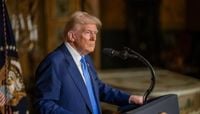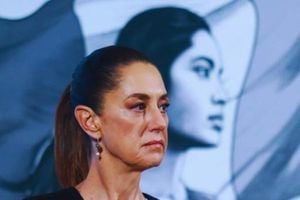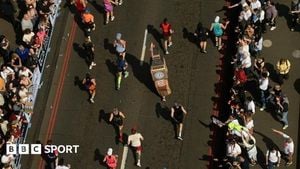U.S. President Donald Trump announced on April 25, 2025, that he may meet with Ukrainian President Volodymyr Zelensky in Rome on April 26, during the funeral of Pope Francis. This potential meeting comes after a tense encounter in February, where Trump and Vice President JD Vance criticized Zelensky for what they perceived as a lack of gratitude for American support in Ukraine’s ongoing conflict with Russia.
The Vatican's seating arrangement at the funeral will place Trump and Zelensky apart, as delegations will be seated in French alphabetical order. Zelensky's attendance at the funeral is uncertain, as he has urgent military meetings in Kyiv following a devastating missile strike by Russia on April 24, which resulted in the deaths of 12 individuals and injuries to 87 others.
On April 25, Zelensky stated, "If I don't have time, Ukraine will be represented at a decent level. The Foreign Minister (Andrii Sybiha) and the First Lady (Olena Zelenska) will be there." In light of Pope Francis's death, Zelensky expressed solidarity, saying, "We grieve together with Catholics and all Christians who looked to Pope Francis for spiritual support." This is not the first time Zelensky has met with the pontiff; their last encounter occurred on October 11, 2024, when Zelensky presented Pope Francis with an oil painting titled The Bucha Massacre — the Story of Marichka, highlighting one of the most notorious atrocities committed by Russian forces during the invasion.
Pope Francis has consistently called for peace throughout the war, although some of his remarks have drawn criticism from Ukraine. For example, on December 15, 2024, he referred to Russia and Ukraine as "brothers," which many Ukrainians felt downplayed Russia's culpability in the conflict. Trump's comments about a possible meeting with Zelensky come amid increasing pressure from his administration for a ceasefire in the ongoing war.
Earlier this week, Trump warned that Washington might withdraw from peace negotiations if progress is not achieved soon. While Kyiv has accepted a U.S.-proposed 30-day truce introduced in March, Moscow has rejected the proposal and continues its military offensive.
In a related development, South African President Cyril Ramaphosa recently praised Zelensky during his visit to South Africa, commending him for agreeing to an unconditional ceasefire to facilitate peace talks with Russia. This meeting, however, was cut short when a missile strike from Russia killed 12 people in Kyiv, prompting Zelensky to return home immediately.
Ramaphosa's government has faced scrutiny for its historically close ties with Russia, dating back to the end of apartheid. The African National Congress (ANC), Ramaphosa's party, has been criticized for its ambiguous stance on the war, but recent actions indicate a shift. On February 24, 2025, South Africa voted for the first time in favor of a United Nations resolution calling for an end to the conflict, signaling a change in its diplomatic posture.
During the short meeting with Zelensky, Ramaphosa expressed that peace talks should commence without preconditions, such as Ukraine ceding territory to Russia. Vincent Magwenya, Ramaphosa's spokesman, stated that the meeting was part of ongoing efforts to achieve a peaceful resolution to the conflict.
Prior to the meeting, Zelensky highlighted the importance of establishing economic and humanitarian links with African countries, stating, "We are not pretending to be exclusive. We are trying to have good bilateral relations with your country." This reflects Ukraine's broader strategy to enhance its international standing and counteract Russia's influence in Africa.
In the context of these developments, Trump has reiterated that there is "no deadline" for reaching a peace agreement, though he aims to expedite the process. His remarks came during a press briefing at the White House, where he mentioned ongoing discussions with Russian President Vladimir Putin. Trump's envoy, Steve Witkoff, met with Putin in Moscow on April 25, emphasizing the U.S. commitment to finding a resolution to the conflict.
Despite Trump's assurances, Secretary of State Marco Rubio warned that the U.S. might abandon its peace efforts within days unless significant progress is made. The divergent views within the U.S. administration highlight the complexities of navigating the diplomatic landscape.
As the situation evolves, both Trump and Zelensky's actions and statements will be closely monitored, particularly in light of the upcoming funeral of Pope Francis, which has become a significant backdrop for potential diplomatic engagements. The world watches as these leaders navigate the intricate web of international relations amid a devastating war.




